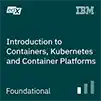IBM: Introduction to Containers, Kubernetes and OpenShift
3.7 stars
10 ratings
This course introduces you to containers and its emerging ecosystem of related technologies such as Docker, Kubernetes, OpenShift, and Istio. You will not only understand the concepts but also practice hands-on in the cloud.

5 weeks
2–3 hours per week
Self-paced
Progress at your own speed
Free
Optional upgrade available
There is one session available:
13,674 already enrolled! After a course session ends, it will be archivedOpens in a new tab.
Starts Apr 15
Ends Jun 30
Introduction to Containers, Kubernetes and OpenShift
Awards

At a glance
- Institution: IBM
- Subject: Computer Science
- Level: Introductory
- Prerequisites:
The “Introduction to Cloud Computing” course, basic computer skills, and understanding of cloud command line, and shell commands is recommended.
- Associated programs:
- MicroBachelors Program in Full Stack Application Development
- Professional Certificate in Cloud Native Foundations
- Professional Certificate in DevOps and Software Engineering
- Professional Certificate in Full Stack Developer
- Language: English
- Video Transcript: English
- Associated skills:Kubernetes, Hybrid Cloud Computing, Containerization, Advising, Virtualization, OpenShift, Docker (Software), Cloud-Native Applications, Virtual Machines, Istio, Docker Container, Programming Concepts, Cloud-Native Computing, DevOps, Systems Engineering, Cloud Development, Cloud Computing
Who can take this course?
Unfortunately, learners residing in one or more of the following countries or regions will not be able to register for this course: Iran, Cuba and the Crimea region of Ukraine. While edX has sought licenses from the U.S. Office of Foreign Assets Control (OFAC) to offer our courses to learners in these countries and regions, the licenses we have received are not broad enough to allow us to offer this course in all locations. edX truly regrets that U.S. sanctions prevent us from offering all of our courses to everyone, no matter where they live.This course is part of DevOps and Software Engineering Professional Certificate Program
Learn moreExpert instruction
15 skill-building courses
Self-paced
Progress at your own speed
1 year 1 month
7 - 9 hours per week
Interested in this course for your business or team?
Train your employees in the most in-demand topics, with edX For Business.

